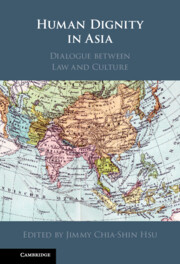Book contents
- Human Dignity in Asia
- Human Dignity in Asia
- Copyright page
- Dedication
- Contents
- Editor and Contributors
- Preface
- Abbreviations
- Introduction Human Dignity, Human Rights, and Cultural Change in Asia
- 1 Human Dignity in Indian Constitutional Adjudication
- 2 The Development of Individual Dignity in Japan
- 3 Constitutional Discourse on Human Dignity in South Korea
- 4 Human Dignity in the Jurisprudence of the Taiwan Constitutional Court
- 5 The Human Dignity Factor
- 6 Human Dignity in the Jurisprudence of the Indonesian Constitutional Court
- 7 Dignity as a Constitutional Value in Hong Kong
- 8 Human Dignity and Relational Constitutionalism in Singapore
- 9 Personal Dignity under Chinese
- 10 Virtue, Dignity, and Constitutional Democracy
- 11 Buddhist Philosophical Approaches to Human Dignity
- 12 Dignity and Status in Ancient and Medieval India
- 13 Human Dignity, Pancasila, and Islam
- 14 Catholicism and Human Dignity in the Philippines
- 15 Protestantism and Human Dignity in South Korea
- Index
5 - The Human Dignity Factor
Interpreting the Philippine Constitution
Published online by Cambridge University Press: 26 July 2022
- Human Dignity in Asia
- Human Dignity in Asia
- Copyright page
- Dedication
- Contents
- Editor and Contributors
- Preface
- Abbreviations
- Introduction Human Dignity, Human Rights, and Cultural Change in Asia
- 1 Human Dignity in Indian Constitutional Adjudication
- 2 The Development of Individual Dignity in Japan
- 3 Constitutional Discourse on Human Dignity in South Korea
- 4 Human Dignity in the Jurisprudence of the Taiwan Constitutional Court
- 5 The Human Dignity Factor
- 6 Human Dignity in the Jurisprudence of the Indonesian Constitutional Court
- 7 Dignity as a Constitutional Value in Hong Kong
- 8 Human Dignity and Relational Constitutionalism in Singapore
- 9 Personal Dignity under Chinese
- 10 Virtue, Dignity, and Constitutional Democracy
- 11 Buddhist Philosophical Approaches to Human Dignity
- 12 Dignity and Status in Ancient and Medieval India
- 13 Human Dignity, Pancasila, and Islam
- 14 Catholicism and Human Dignity in the Philippines
- 15 Protestantism and Human Dignity in South Korea
- Index
Summary
The 1987 Philippine Constitution entrenched the right to human dignity – a concept that the Philippine Supreme Court has invoked since the 1940s. This chapter argues that Filipino justices have been using“dignity”or “human dignity”to avoid a strict originalist or textualist interpretation of constitutional provisions. They cite dignity as justification to expand existing constitutional rights or to uphold governmental actions that facilitate full enjoyment of such rights. They employ the dignity language mainly to further individual self-fulfilment, autonomy, or self-realization, subject only to select community interests that are expressly recognized in the Constitution. Such understanding and use of dignity in judicial interpretation has been largely shaped by culturally traumatic historical events, Catholic teachings, and nonmunicipal laws. Despite almost eighty years of invoking dignity in judicial interpretation and adjudication, however, the right to human dignity has yet to be consistently and faithfully used for what it was meant to be – a standard principle of interpretation to which Filipino justices must adhere in human rights adjudication.
Keywords
- Type
- Chapter
- Information
- Human Dignity in AsiaDialogue between Law and Culture, pp. 110 - 138Publisher: Cambridge University PressPrint publication year: 2022

